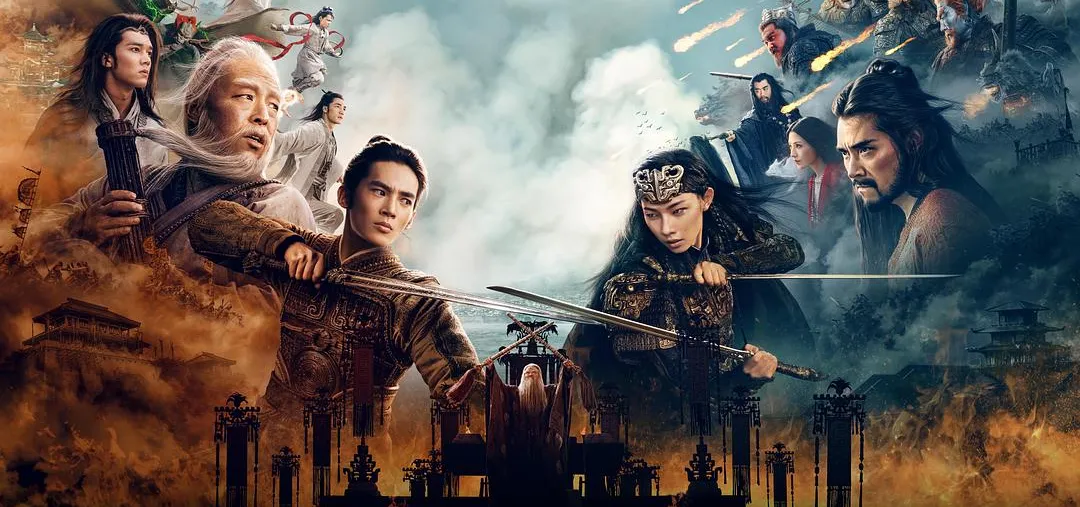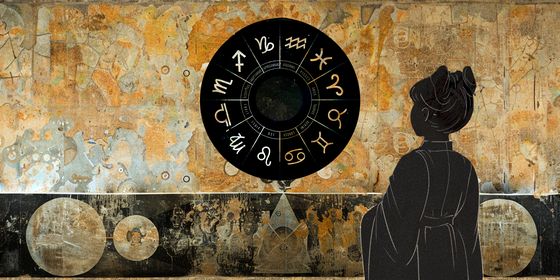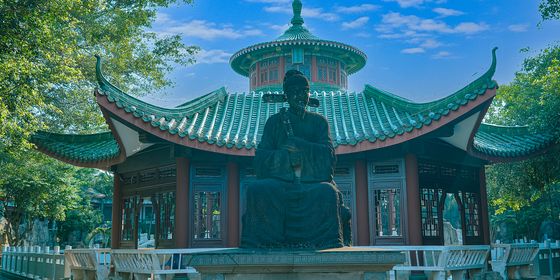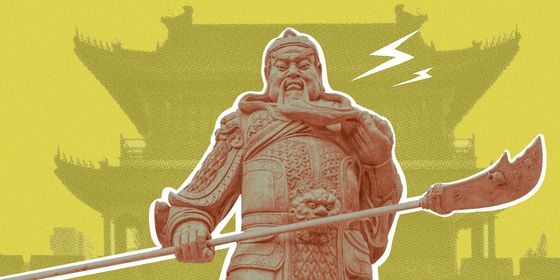Discover the epic tale behind “Ne Zha 2” with “Investiture of the Gods”—A 16th century Chinese novel of gods, heroes, and legendary battles
Editor’s Note: The 2025 Chinese New Year holiday saw a strong comeback for the film box office after a slump in 2024. The eight-day holiday generated a total revenue of 9.5 billion yuan (about 1.2 billion USD), equivalent to over 20 percent of the 2024 annual box office. A classic Chinese tale is driving the season’s success and dominating the media’s attention—Investiture of the Gods. Both the box office record-breaking animation, Ne Zha 2, and the historic fantasy, Creation of the Gods II: Demon Force, are adapted from this 16th-century classic novel. The novel has inspired numerous TV series, films, and other performances, solidifying its place as a cornerstone of China’s popular culture. Revisiting the original text is certainly worthwhile. Here’s a review of the fantasy epic from our archives:
Dynasties fall, deities are born, soldiers fight to their last, and gods take to the field of battle. Investiture of the Gods, or Fengshen Yanyi (《封神演义》), is an oft-overlooked Chinese masterpiece of fiction and history that marries the wonder of an ancient world of gods and demons with an inevitable war to destroy a corrupt dynasty. This 16th-century novel will sate any appetite for the mystic, adventurous histrionics of classic Chinese storytelling, and provides insight into the hodgepodge of Chinese folk legends and beliefs that have given cause for wonder for thousands upon thousands of years.
As with the famous opus to the Monkey King, Investiture of the Gods is what is termed a shenmo xiaoshuo (神魔小说) or “gods and demons fiction”—an apt genre title for a book that pits demons against men, men against gods, and gods against one another. The events of the book take place in the reign of King Zhou of the Shang dynasty from 1075 to 1046 BCE, an almost primeval time that warrants the mysticism and fairy tale nature prevalent throughout the work. The historical events are loosely based on the famous account of Sima Qian (司马迁), Records of the Grand Historian (《史记》), but these historical characters soon find themselves up against religious super-weapons and mythic monsters. The story itself is a chronicle foretold and very much in the hands of fate—the heroes and devils decided long in advance. Perhaps the Master of Clouds put it best: “First the Shang dynasty must come to an end; second, the Zhou dynasty is rising to replace it; third, immortals will meet with disaster; fourth, Jiang Ziya will enjoy worldly glory; and fifth, gods are to be created.”
Fengshen Yanyi recounts the creation of the (supposedly) 365 celestial deities, and they all get their start with the overly familiar King Zhou. His great sin amounts to blasphemy against a poem written to the goddess Nüwa, the creator of mankind, who also repaired the northwestern section of the sky with multicolored stones after it had collapsed. On her birthday, the King, then known as a just and wise sovereign, wrote a poem in her temple, ending with the lines, “I pray that you come alive, with sweet voice and gentle movements, and I’ll bring you along to my palace.” His meaning was clear and unfortunately for King Zhou, his dynasty, and countless lives, it was also obvious to Nüwa; she took severe umbrage at his overt familiarity. Her response to the kind of words were thus: “He doesn’t think how to protect his country with virtue and morality. On the contrary, he shows no fear of Heaven and insults me with his dirty poem. How vile he is! The Shang dynasty’s already ruled for 600 years and is coming to an end.”
Hatred of King Zhou and his characterization as the villain is hardly the stuff of fiction; in fact, even his name is a posthumous pejorative, Zhou Wang (King Zhou) rather than Di Xin (Emperor Xin, his living title). He is, even in modern day, reviled as an evil and unfit emperor. And, while the goddess Nüwa was his ultimate undoing, the source of his wickedness and debauchery comes from another female character, quite possibly the greatest female villain in all of Chinese literature: Daji.
Daji is Nüwa’s weapon against King Zhou. Indeed, she is not Daji, daughter of Su Hu, at all. Rather, she is a 1,000-year-old fox spirit sent by Nüwa to kill and possess the innocent and beautiful Daji in order to destroy King Zhou and end his dynasty. Promising the fox spirit and her two other partners (a female pheasant sprite with nine heads, and a jade lute sprite) riches upon the auspicious beginning of the new dynasty, the fox spirit does indeed “suck out Daji’s soul and occupy her body.” Enamored with the newly-possessed Daji, King Zhou becomes both distracted and cruel—buoyed up by his crooked ministers. Rather than taking it upon herself to simply ruin the Shang dynasty, Daji turns to incredible acts of cruelty and hedonism.
By Chapter Six, Daji has designed a torture implement that: “uses a hollow pillar of brass, twenty feet in height and eight in circumference. It has three doors in its upper, middle, and lower part, through which charcoal is placed inside.” The criminals are then stripped and chained to the red hot pillar until their “bones flesh, and blood will turn into fetid smoke and disappear.” It’s called “The Bronze Toaster (炮烙之刑).” By Chapter Seventeen, fully enthralled and under Daji’s spell, King Zhou constructs a 50-foot pit filled with poisonous spiders and snakes (paid for by the taxpayers: four snakes from every household) in which he throws 72 maidens who were bound, shaved, and stripped before their execution: “King Zhou watched as they were thrown into the pit. The serpents coiled around them, devouring their flesh and boring into their intestines. All died tragically.” King Zhou then turned to Daji and said, “This ingenious invention of yours is really too wonderful for words.”
Perhaps even more famous are the constructions of profligacy; one of which is the “Meat Forest.” Placed maliciously next to the snake pit, 50 women and 50 eunuchs were set loose on a swimming pool of wine and a “forest” of cooked meat. However, this wasn’t just for entertainment; once fully inebriated, a select few of the merrymakers would be savagely beaten to death (with golden hammers, of course) and taken to Daji, who, as it happens, needed to subsist on a diet of human flesh. The final death knell for King Zhou was Daji’s insistence on building the “Deer Gallery”—a near 50-foot-tall pleasure tower adorned with marble, jade, railings made of pearls, and jewels from fable lining the ceiling. With that, Daji could have happily rested on her laurels, but, instead, continues to murder and wreak havoc with careless, ruthless abandon.
With villains as fascinating and brutal as these, the hero of our tale is Jiang Ziya, renowned as one of the most brilliant military strategists in Chinese history. In Investiture of the Gods, however, he cuts a somewhat humble (yet almost entirely unbeatable) figure, not least because he has the power of divination. He is the polar opposite of the horrific advisors to King Zhou, serving King Wen (and later his son King Wu) faithfully and leading a 1,600,000-strong army to sack the capital, Zhaoge, and win the kingdom. The real and legendary tales of Jiang Ziya are well known throughout China, but he is so much more in Investiture of the Gods: a genius, a saint, a tool of the gods, a magician, a fortune teller, and by the end of the novel he is able to impart divinity on the living and the dead.
While it is easy to look on the battle as one of good versus evil, it’s made clear from the outset that all of the characters in the story are puppets of fate. So, while one general may fight ruthlessly against hero Jiang Ziya’s army, the general may do so honorably and in the service of his emperor, thus ensuring eventual divinity at the mortal hands of Jiang Ziya. It is necessary, then, to remember that, while reading the book, you are not reading the epiphanies, quandaries, and failures of characters in a novel, but future constellations and deities.
The humans, spirits, and gods in the novel are given unique and sometimes truly amazing powers. There’s Li Gen, a lizard-like nature spirit, with red hair, a purple face, and long fangs; there’s Muzha, the god that studies under the Superior-man Universal Converter of White Egret Cave; there are the Five Colored-Face demons that whip up a whirlwind of fire and chuck dust and stones; there’s the 15-foot-tall Liu Qian; there’s the famous, once-dead god, Nezha, who was born a fighting ball of flesh after his mother had been pregnant with him for three and a half years; there’s the Master of Clouds who causes the stars and planets to shake when he walks. With each character come ever more remarkable weapons, and even the beasts on which they ride are the stuff of nightmares, curious monsters that would make your average chimera blush.
It must be said, however, that very few of these characters are given any depth and they simply serve as concepts and pawns in the larger war for and against the dying Shang dynasty. In contrast to something like Romance of the Three Kingdoms, which has many fleshed out characters, Investiture of the Gods falls short. But, then again, the warfare, as one might glean from such an eclectic group of characters, is imaginative in the extreme: characters fly a thousand li a day, others burrow under the earth at similar speeds, and some tell the future and walk on clouds.
Entire books could be written on the religious context, and merely naming the characters and their deification could easily fill this article, and then some. The book itself is often seen as something of a controversy, with authorship attributed back and forth by angry ancient scholars from Xu Zhonglin (徐仲琳) to Lu Xixing (陆西星). Even the mysticism is suspect; Daoism, for example, plays an extremely important role as, at the very least, King Wu’s army could not exist without it, despite the fact that Daoism did not come into existence for another 500 years in the novel’s timeline. But, such is often the case with great works of ancient Chinese fiction, taking weeks to read and lifetimes to appreciate.
Journey to the West, Dream of the Red Chamber, Romance of the Three Kingdoms, Outlaws of the Marsh—you can’t move to China without someone telling you how you simply must read them, but there is so much more once that mighty canon is finished. For those inclined toward ancient Chinese battles, primordial weapons of horrific power, and drama that spans the whole of heaven, earth, and hell, there is Investiture of the Gods.
This story, originally published in 2015, has been lightly edited and updated as of February 11, 2025.












